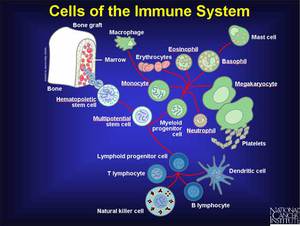Immune System
Organs Of The Immune System

The organs of the immune system either make the cells that participate in the immune response or act as sites for immune function. These organs include the lymphatic vessels, lymph nodes, tonsils, thymus, Peyer's patch, and spleen. The lymph nodes are small aggregations of tissues interspersed throughout the lymphatic system. White blood cells (lymphocytes) that function in the immune response are concentrated in the lymph nodes. Lymphatic fluid circulates through the lymph nodes via the lymphatic vessels. As the lymph filters through the lymph nodes, foreign cells of microorganisms are detected and overpowered.
The tonsils contain large numbers of lymphocytes. Located at the back of the throat and under the tongue, the tonsils filter out potentially harmful bacteria that may enter the body via the nose and mouth. Peyer's patches are lymphatic tissues which perform this same function in the digestive system. Peyer's patches are scattered throughout the small intestine and the appendix. They are also filled with lymphocytes that are activated when they encounter disease-causing microorganisms.
The thymus gland is another site of lymphocyte production. Located within the upper chest region, the thymus gland is most active during childhood when it makes large numbers of lymphocytes. The lymphocytes made here do not stay in the thymus, however; they migrate to other parts of the body and concentrate in the lymph nodes. The thymus gland continues to grow until puberty; during adulthood, however, the thymus shrinks in size until it is sometimes impossible to detect in x-rays.
Bone marrow, found within the bones, also produces lymphocytes. These lymphocytes migrate out of the bone marrow to other sites in the body. Because bone marrow is an integral part of the immune system, certain bone cancer treatments that require the destruction of
Colored scanning electron micrograph of a white blood cell (pink and white) attacking a Staphylococcus aureus bacterium (yellow).
bone marrow are extremely risky, because without bone marrow, a person cannot make lymphocytes. People undergoing bone marrow replacement must be kept in strict isolation to prevent exposure to viruses or bacteria.
The spleen acts as a reservoir for blood and any rupture to the spleen can cause dangerous internal bleeding, a potentially fatal condition. The spleen also destroys worn-out red blood cells. Moreover, the spleen is also a site for immune function, since it contains lymphatic tissue and produces lymphocytes.
Additional topics
Science EncyclopediaScience & Philosophy: Hydrazones to IncompatibilityImmune System - Organs Of The Immune System, Specific Immune Defenses, A Closer Look At Antibodies - Overview of the immune system, The non-specific defenses, How antibodies work to destroy invaders